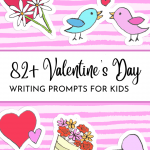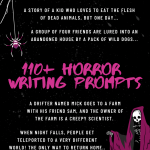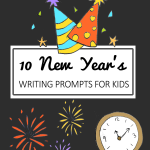58 Easter Writing Prompts to Get Your Kids Writing
The sweetest holiday of them, Easter is coming up! I know many of you will be busy hunting for chocolate eggs and chasing the Easter bunny around. But if you do have some spare time, why not get writing? Our writing prompts cover the true meaning of Easter to chocolate eggs and Easter bunnies. And you don’t have to write long stories with hundreds of words, you could write a short poem or a card for your friends and family. To help you out, here are 58 Easter writing prompts to get you inspired for the Easter holidays.
58 Easter Writing Prompts
These Easter writing prompts cover everything from the true meaning of Easter to fun Easter bunnies and colourful eggs.
- Easter celebrates, the resurrection of Jesus. This resurrection established Jesus as the powerful Son of God and is cited as proof that God will judge the world in righteousness. If you could go back in time to this very day, what would you feel, see and experience?
- You wake up on Easter to discover that you have become the Easter Bunny. What would your day be like as an Easter bunny? Describe your experience.
- How do you celebrate Easter? Do you have any family traditions on that day? What do you eat? What do you wear? Do you go anywhere special?
- Easter is all about miracles. What miracle do you hope to see this Easter? Or you could write about a miracle that you may have already experienced.
- Why do you think that Easter egg hunting is only done during Easter?
- Complete the sentence, I love Easter because… What do you love the most about Easter? Is it the chocolate bunnies, Easter egg hunting, egg decorating or something else?
- Write a step-by-step guide to organising the best Easter egg hunt ever. Where would you hide the eggs? Would you use special colours on the eggs?
- Some of the colours used during Easter include red, white, purple, pink, green and yellow. What do you think these colours mean?
- Easter egg decoration is a fun Easter Activity. How do you decorate your Easter eggs? What colours do you use? Do you use any decorations? What patterns do you paint?
- During an egg hunt, you find a magical glowing egg. What happened next? Did anything interesting come out of the egg? Why was it glowing? Does it have magical powers?
- Write a letter to the Easter Bunny. You can ask him about where he lives. What does he do when Easter ends? How does he celebrate the holiday?
- What do you think the history of the Easter Bunny is? Where did he come from?
- Write a poem using the words eggs, bunny and resurrection.
- Finish this sentence in 10 different ways: I woke up on Easter morning and saw…
- The Easter bunny is normally the face of Easter. Imagine if another animal was the face of Easter. What animal would you choose to represent Easter and why? How would this animal change Easter?
- Imagine the Easter Bunny accidentally mixes up all the Easter eggs from different countries around the world. Write a story about a child who receives an egg with a unique decoration and tradition from another culture.
- Imagine you are a witness to the discovery of the empty tomb. Describe what you see, hear, and feel in that moment.
- Explain the symbolism of the cross and its importance in the Easter story.
- Write a story about a character who experiences a personal “resurrection” or renewal of hope in their life.
- Design your own unique Easter egg and describe its creative details and symbolism.
- Write a poem or short story capturing the sights, sounds, and smells of springtime associated with Easter.
- Describe your favourite Easter tradition and how it promotes feelings of community and togetherness.
- Imagine you are a young Easter bunny helping your family prepare for the big day. Describe your duties and how you contribute.
- Write a mystery story about a missing Easter egg and the search to find it before the big hunt.
- Research and present information about how Easter traditions vary around the world.
- Imagine you witnessed the events leading up to Easter. Write a story from the perspective of a bystander, focusing on the themes of forgiveness and redemption.
- Research a specific symbol associated with Easter (e.g., the empty tomb, the cross). Write a poem or short story exploring the meaning and significance of this symbol.
- Create a comic strip depicting a typical day in the life of the Easter Bunny, showcasing his preparations and challenges before Easter.
- Write a persuasive letter to the Easter Bunny, arguing for the inclusion of non-candy alternatives in Easter baskets to promote healthier choices.
- Imagine finding an Easter egg that contains a message from someone in the past. What does it say? How does it impact you?
- In a world where Easter traditions have faded, a child discovers a forgotten Easter egg containing a lost baby bunny. Write about their journey to reunite the bunny with the Easter Bunny.
- Imagine a world with no Easter celebrations. Write a story about the consequences and how people rediscover the meaning of the holiday.
- After receiving a basket full of Easter treats, a child decides to share it with someone in need. Write about the experience and the lessons learned about the true spirit of giving.
- Write a story where someone struggles with forgiveness, but finds inspiration in the message of Easter.
- Write a letter to a younger version of yourself explaining the deeper meaning of Easter beyond the fun activities and candy.
- Write a story about someone who feels lost and hopeless, but finds renewed hope and faith through the message of Easter.
- Explore the impact of a single act of kindness or forgiveness, inspired by the story of Easter, rippling outward and affecting others.
- Imagine you have a conversation with someone who doesn’t believe in the Easter story. Explain your understanding of its meaning and why it holds significance.
- Write a poem about the sacrifice and love associated with the Easter story.
- Choose one aspect of the Easter story (hope, forgiveness, love, etc.) and write about how you can actively incorporate it into your daily life.
- Imagine the Easter story continuing beyond the resurrection. What happens to the disciples and others impacted by the events? Write a fictional continuation of the story.
- Easter celebrates the triumph of light over darkness. Think of a personal experience where you faced darkness and found your own “light.” Write a story about it.
- Many people associate Easter with candy and fun traditions. Write a piece reflecting on how you can connect these traditions to the deeper meaning of Easter.
- The concept of unconditional love is often associated with Easter. Write a letter to someone you love, expressing your love and its significance in your life.
- Easter coincides with spring, a time of renewal and growth in nature. Reflect on a time when you experienced personal growth or overcame a challenge. Explain how you can use this experience to inspire others.
- The concept of resurrection symbolizes a new beginning. Write a story about a character who receives a second chance at something important and how they use this opportunity for good.
- ope is a central theme in the Easter story. Write a poem about finding hope in unexpected places, drawing inspiration from the Easter narrative.
- Write a dialogue between two characters with differing viewpoints on the Easter story. Their conversation can address questions such as faith, doubt, and the meaning of Easter.
- Symbols like the cross, the empty tomb, or the lily hold significant meaning in the Easter story. Choose one symbol and write a poem or short story exploring its meaning and its impact on your understanding of the Easter message.
- Imagine exchanging letters with a historical figure who witnessed the events of Easter. What questions would you ask? What message would you share?
- Imagine receiving a special gift on Easter Sunday that allows you to experience the world through the eyes of another person. How does this experience deepen your understanding of the Easter message?
- Imagine interviewing an individual who witnessed Jesus’ life and teachings. What would they share about his legacy and how it continues to inspire people today?
- Choose a specific act of compassion or service you can perform in your community and explain how it connects to the spirit of Easter.
- Imagine the Easter eggs themselves are sentient and plan a daring escape from the Easter Bunny’s basket. Write a story about their adventure.
- How do you share the meaning of Easter with younger siblings, friends, or family members who may not understand the religious aspects?
- Choose an unexpected character, like a historical figure, an animal, or an inanimate object, and write a story about their experience of Easter.
- Conduct a mock interview with someone dressed as the Easter Bunny. Ask them questions about their life, Easter traditions, and favourite Easter memories.
- Write a story about a hilarious competition between different animals to bake the best Easter treats.
Share your Easter stories with us!
How will you be celebrating Easter? Got any interesting Easter stories? Share them with us in the comments below. In the meantime, you can check out these 16 Easter books for kids aged between 8 and 11 or this list of Easter Books for 5-6 Year Olds.






Comments loading...